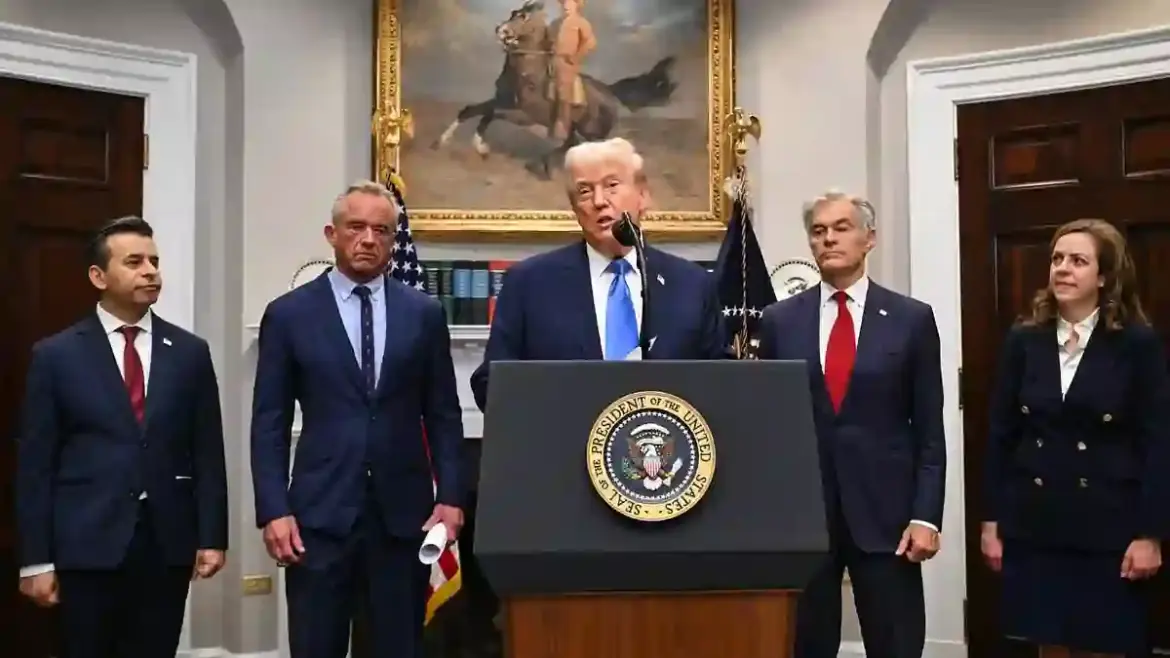President Donald Trump sparked headlines on Monday with a series of comments urging parents to reconsider giving infants the Hepatitis B vaccine and warning against acetaminophen use during pregnancy.
Speaking from the Roosevelt Room, Trump framed his remarks as part of a broader push for what he and his team call a “health revolution” in the U.S.
Recommendations on Hepatitis B Vaccine
Trump suggested that the Hepatitis B vaccine, commonly given to newborns, could safely be delayed until children are around 12 years old.
He cited the disease’s sexual transmission as a reason for waiting, despite medical experts pointing out that Hepatitis B can also spread through needles, open wounds, and other non-sexual routes.
“There’s no reason to give a baby that’s almost just born Hepatitis B.
I would say wait ‘til the baby is 12-years-old and formed,” he said, flanked by top medical advisers.
He also advocated for spreading out the vaccine schedule, rather than giving multiple shots at once or combined vaccines, emphasizing his belief that timing could make a difference in long-term health outcomes.
Concerns About Acetaminophen During Pregnancy
In addition to vaccines, Trump focused on acetaminophen, the active ingredient in Tylenol, warning pregnant women against its use.
He claimed that prenatal exposure to the pain reliever could contribute to childhood autism and ADHD.
“Don’t take Tylenol! Don’t do it,” Trump repeatedly instructed during the press conference.
Trump’s comments came as part of a broader effort by Health and Human Services Secretary Robert F. Kennedy Jr., who has been leading investigations under the “Make America Healthy Again” initiative into rising autism rates in the U.S.
Key Figures at the Press Conference
Joining Trump were several notable figures in health policy, including Dr. Mehmet Oz, Administrator for the Centers for Medicare & Medicaid Services; Marty Makary, U.S. Commissioner of Food and Drugs; Dr. Jay Bhattacharya, Director of the National Institutes of Health; Heidi Overton from the America First Policy Institute; and Acting Assistant Secretary for Health Dr. Dorothy Fink.
Kennedy, while cautious about making firm public recommendations regarding acetaminophen, emphasized that ongoing research will continue to explore potential links between prenatal medication use, vaccines, and autism.
“We expect this to be the first of many announcements over the coming years on underlying causes of autism and potential paths for reversal,” Kennedy said, highlighting vaccines as one area of investigation.
Trump’s Approach and Public Reaction
Trump acknowledged that his comments were ahead of some of his advisers’ recommendations, particularly those of Kennedy, and joked that he hoped he hadn’t “ruined his day.”
Despite this, the president remained firm in his guidance for parents, framing the conversation as part of a larger public health mission.
As the administration continues its investigations, both Trump and Kennedy have promised further updates and announcements in the coming years regarding the causes of autism and related health issues in children.
